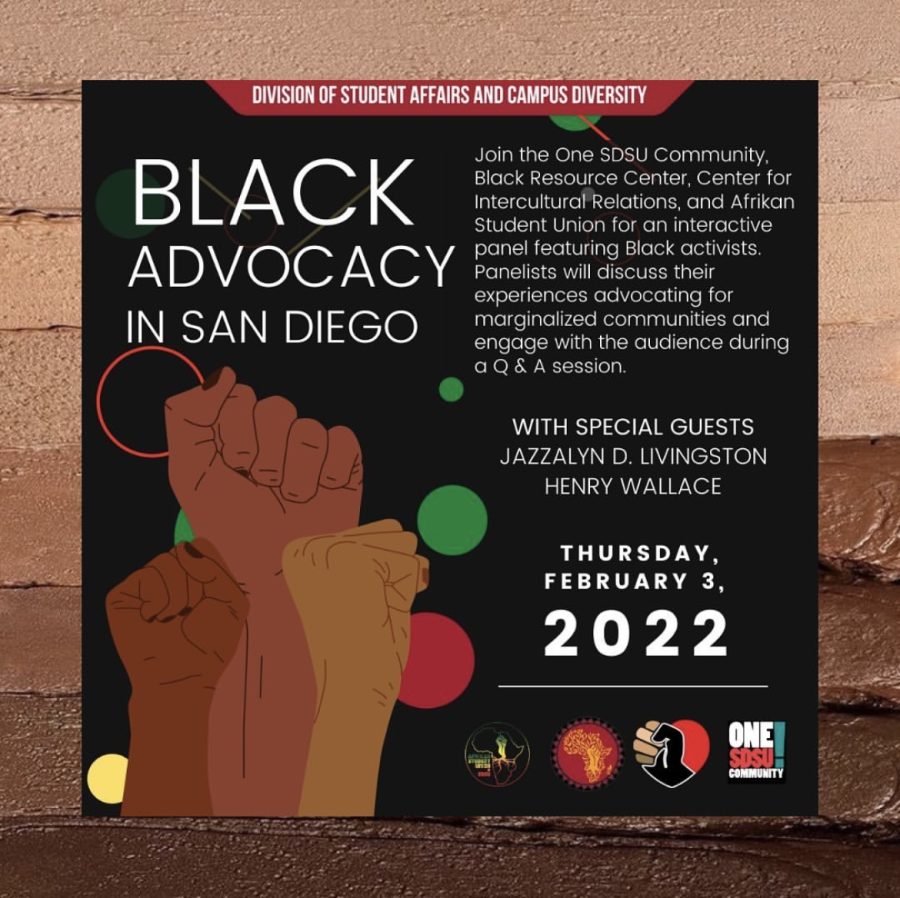“Black History is a reminder of our contributions to the world. For far too long, our history has been hidden. Our creations have been hijacked by those who want us to believe that we never created nothing, therefore we don’t matter. They willfully hid our truths, by not publishing any of our accomplishments and not sharing this truth with the world. Black History informs the world of our accomplishments. The governments and the super capitalist owe the Black race a great debt for the inhumane genocidal cruelty they leveled against our people. Black History is a reminder to speak truth to power, stay vigilant about our civil freedoms and fight for our rights as citizens of the world” – Henry Wallace.
On Thursday Feb. 3, San Diego State’s Black Resource Center, the Center for Intercultural Relations, the African Student Union, and One SDSU Community hosted a Zoom event where speakers Henry Wallace and Jazzalyn Livingston spoke on their rise to Black advocacy in San Diego. What led to their involvement in Black advocacy came from straining experiences that fueled their determination to make a difference in their community.
ASU members Jaylen Citizen and Ava Walker were co-hosts of this event and took note to highlight Wallace and Livingston’s accomplishments.
“Henry Wallace has contributed to the San Diego community by advocating for marginalized communities,” Citizen said. “In 2016, he was interviewed by the SDSU Digital Library to celebrate the 50th anniversary of the Black Panther Party. Currently, Wallace serves as the Chairman of the San Diego Original Black Panther Party for Community Empowerment.”
Livinsting, along with her many achievements is also an alumnus of SDSU.
“Jazzalyn Livingston is the President of UCSD’s Black Student Union Executive Board. Ms. Livingston has served as the Director of Student Affairs for the Afrikan Black Coalition, the largest Black collegiate organization in California, as well as the National Program Manager for the NAACP Youth and College Division,” Walker said.
Wallace and Livingston reflected on many of their past experiences, which led them to their activism today.
In 1965, Wallace and his fellow band members were getting ready for a show in Richmond when a riot broke out. Police were shooting their guns from the roof and Wallace had to hide in a Black-owned funeral home for safety. It was then that Wallace’s family decided to move to San Diego. In San Diego, Wallace’s sister and boyfriend were approached by Eldridge Cleaver of the Black Panther Party and were offered to open a chapter in the city. One day while Mr. Wallace was selling newspapers with his family, cops pulled them over because they thought they were bulgarizing.
“The disrespect was so strong that I was forced to leave my entertainment and start becoming an advocate for my people and from there is when I started really understanding what our people were going through,” Wallace said.
Livingston grew up in Los Angeles in the ‘90s during a time where the conditions of the city shaped the community. When she was 13 years old, she lost her 19-year-old brother Curtis to gun violence.
“Whether that’s in our community violence, police brutality, a vigilante targeting black communities, there’s a number of gun violence that’s happening in our community at a very sad rate to where we’re losing a lot of young people. My brother was one of those young people. It was the time where advocacy allowed me to start using my voice and share my brother’s story,” Livingston said.
The stories Wallace and Livingston discussed had a parallel dynamic. Even though they grew up in different eras, their experiences highlighted unfair treatment of innocent people, lack of resources, and a broken capitalist system in the black community. However, their perseverance within their advocacy led them to uplifting their community through the organizations they are a part of. Wallace shared that in 1966, the Black Panther Party created a Ten Point Platform which listed the ideals and ways of their operation. The demands for this platform can be found here.
Livingston’s organization, Black Girls Leadership Academy was created back in 2020 to provide young Black women with digital literacy where they can find resources to “educational equities and manage mental and emotional stress through mentorship, schooling, culture, exploration, community service and deal with economic instability in the new covert reality,” according to Livingston.
Those who attended this event learned a great deal about black advocacy not just in San Diego, but on campus as well.
“I want the students at SDSU to know that the San Diego Original Black Panther Party members were students at SDSU (SDSC), that out of this campus the Original Black Panther Party of San Diego was created by two students (Mr. Kenneth Denmon and his girlfriend Ms. Shirley Jean Meadors),” Wallace said. “They were members of the Black Students Union at SDSU. Therefore, you are all honorary San Diego Black Panther Cubs. I pass our baton to your generation to continue the fight for equal justice, the peaceful pursuit of happiness and righting of wrongs in civil life and education.”
The BRC is located at 5723 Lindo Paseo. They are open Monday through Thursday from 10 a.m. to 6 p.m. and Fridays from 10 a.m. to 4 p.m







